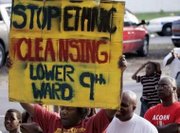Friday, February 23, 2007
Storm Still Raging on Gulf Coast
Blanco backs using some developments
Governor wants housing replaced eventually
By CAIN BURDEAU:Associated Press writer Published: Feb 23, 2007
NEW ORLEANS (AP) — Taking a middle-road position, Gov. Kathleen Blanco said the federal government should rehabilitate as many of its New Orleans housing developments for the poor as it can for immediate occupancy, while proceeding with long-term plans to demolish and replace some of the developments.
“There is definitely a crisis in bringing back housing affordable and otherwise,” Blanco told a U.S. House subcommittee meeting to discuss housing problems almost 18 months after Hurricane Katrina struck.
The subcommittee on Housing and Community Opportunity, chaired by U.S. Rep. Maxine Waters, D-Calif., heard differing views on the U.S. Department of Housing and Urban Development’s plan to demolish about 7,300 apartments that make up four sprawling public housing complexes.
Many residents and a growing consortium of preservationists and activists argue that the aging but solidly built brick buildings can be fixed and turned into islands of recovery for the city, housing thousands of families that are still displaced.
On the other side, a large segment of the populace and many officials on the state and city level are wary about rehabilitating the post-World War II complexes, arguing that they had become social engineering projects gone awry. They support the HUD plan to replace the complexes with “mixed-income” neighborhoods styled after historic New Orleans architecture, such as shotgun homes.
Crime and other social ills were a problem at the complexes, though social activists say they became so plagued in large part because social services were stripped when black occupants replaced white occupants.
Rep. Randy Neugebauer of Texas, one of two Republicans at the hearing, questioned whether public housing residents are eager to return. He cited examples of available housing stock remaining empty and HUD’s estimate that only 60 percent of former residents have shown an interest in returning.
But his comments drew loud condemnation from a crowd comprising many black residents.
Blanco, who testified but did not answer questions, also was jeered by the crowd while she addressed problems with the Road Home program, the state-program set up to hand out federal grant money for homeowners who want to repair, rebuild or relocate after their homes were damaged or destroyed by Katrina or Hurricane Rita.
Today, the subcommittee will turn its attention to Mississippi. There are plans to hear testimony in Gulfport, Miss., from panels of federal, state and local officials along with several advocates for preserving affordable housing on the Mississippi Gulf Coast.
John Jopling, senior attorney for the Mississippi Center for Justice in Biloxi, a nonprofit legal advocacy group, said Katrina priced many low-income residents out of the rental market and destroyed much of the region’s already-scarce stock of federally subsidized public housing.
“Not enough was done before the storm,” he said. “Certainly not enough is being done now.”
Jopling said he is urging federal housing officials to replace every unit of storm-damaged public housing without displacing any residents. GSSC
At some point it has to be realized that what is happening on the Gulf Coast is social engineering at its worst. To compound matters its an election season and the lives of the citizens are being politicized. The worst thing about America's democracy is the politicos using the peoples plight as a means to an end. Whether Republican or Democrat the misuse is criminal. hlr
Governor wants housing replaced eventually
By CAIN BURDEAU:Associated Press writer Published: Feb 23, 2007
NEW ORLEANS (AP) — Taking a middle-road position, Gov. Kathleen Blanco said the federal government should rehabilitate as many of its New Orleans housing developments for the poor as it can for immediate occupancy, while proceeding with long-term plans to demolish and replace some of the developments.
“There is definitely a crisis in bringing back housing affordable and otherwise,” Blanco told a U.S. House subcommittee meeting to discuss housing problems almost 18 months after Hurricane Katrina struck.
The subcommittee on Housing and Community Opportunity, chaired by U.S. Rep. Maxine Waters, D-Calif., heard differing views on the U.S. Department of Housing and Urban Development’s plan to demolish about 7,300 apartments that make up four sprawling public housing complexes.
Many residents and a growing consortium of preservationists and activists argue that the aging but solidly built brick buildings can be fixed and turned into islands of recovery for the city, housing thousands of families that are still displaced.
On the other side, a large segment of the populace and many officials on the state and city level are wary about rehabilitating the post-World War II complexes, arguing that they had become social engineering projects gone awry. They support the HUD plan to replace the complexes with “mixed-income” neighborhoods styled after historic New Orleans architecture, such as shotgun homes.
Crime and other social ills were a problem at the complexes, though social activists say they became so plagued in large part because social services were stripped when black occupants replaced white occupants.
Rep. Randy Neugebauer of Texas, one of two Republicans at the hearing, questioned whether public housing residents are eager to return. He cited examples of available housing stock remaining empty and HUD’s estimate that only 60 percent of former residents have shown an interest in returning.
But his comments drew loud condemnation from a crowd comprising many black residents.
Blanco, who testified but did not answer questions, also was jeered by the crowd while she addressed problems with the Road Home program, the state-program set up to hand out federal grant money for homeowners who want to repair, rebuild or relocate after their homes were damaged or destroyed by Katrina or Hurricane Rita.
Today, the subcommittee will turn its attention to Mississippi. There are plans to hear testimony in Gulfport, Miss., from panels of federal, state and local officials along with several advocates for preserving affordable housing on the Mississippi Gulf Coast.
John Jopling, senior attorney for the Mississippi Center for Justice in Biloxi, a nonprofit legal advocacy group, said Katrina priced many low-income residents out of the rental market and destroyed much of the region’s already-scarce stock of federally subsidized public housing.
“Not enough was done before the storm,” he said. “Certainly not enough is being done now.”
Jopling said he is urging federal housing officials to replace every unit of storm-damaged public housing without displacing any residents. GSSC
At some point it has to be realized that what is happening on the Gulf Coast is social engineering at its worst. To compound matters its an election season and the lives of the citizens are being politicized. The worst thing about America's democracy is the politicos using the peoples plight as a means to an end. Whether Republican or Democrat the misuse is criminal. hlr
Subscribe to:
Posts (Atom)










